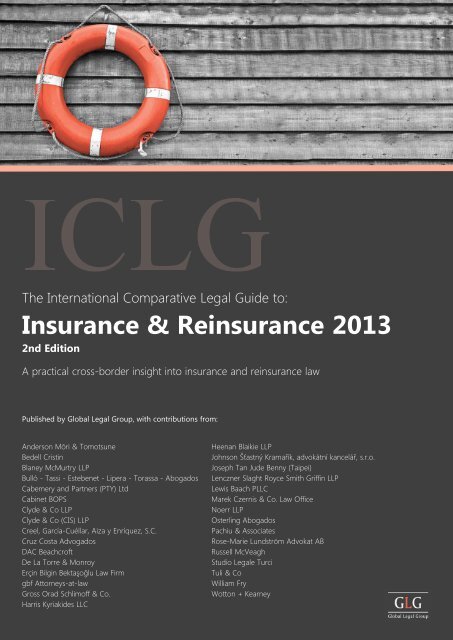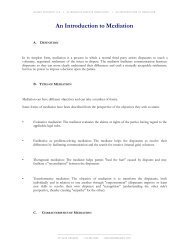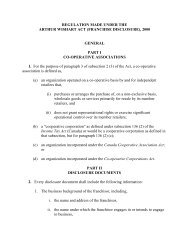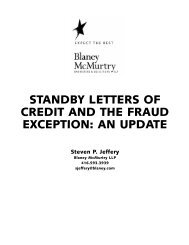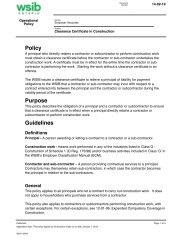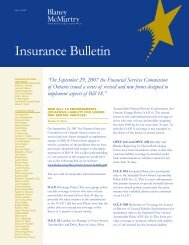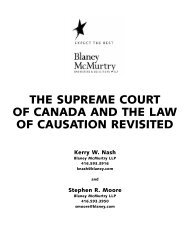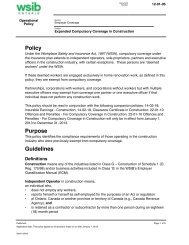A Canadian Roadmap - Blaney McMurtry LLP
A Canadian Roadmap - Blaney McMurtry LLP
A Canadian Roadmap - Blaney McMurtry LLP
You also want an ePaper? Increase the reach of your titles
YUMPU automatically turns print PDFs into web optimized ePapers that Google loves.
The International Comparative Legal Guide to:<br />
Insurance & Reinsurance 2013<br />
2nd Edition<br />
A practical cross-border insight into insurance and reinsurance law<br />
Published by Global Legal Group, with contributions from:<br />
Anderson Mōri & Tomotsune<br />
Bedell Cristin<br />
<strong>Blaney</strong> <strong>McMurtry</strong> <strong>LLP</strong><br />
Bulló - Tassi - Estebenet - Lipera - Torassa - Abogados<br />
Cabemery and Partners (PTY) Ltd<br />
Cabinet BOPS<br />
Clyde & Co <strong>LLP</strong><br />
Clyde & Co (CIS) <strong>LLP</strong><br />
Creel, García-Cuéllar, Aiza y Enríquez, S.C.<br />
Cruz Costa Advogados<br />
DAC Beachcroft<br />
De La Torre & Monroy<br />
Erçin Bilgin Bektaşoğlu Law Firm<br />
gbf Attorneys-at-law<br />
Gross Orad Schlimoff & Co.<br />
Harris Kyriakides LLC<br />
Heenan Blaikie <strong>LLP</strong><br />
Johnson Šťastný Kramařík, advokátní kancelář, s.r.o.<br />
Joseph Tan Jude Benny (Taipei)<br />
Lenczner Slaght Royce Smith Griffin <strong>LLP</strong><br />
Lewis Baach PLLC<br />
Marek Czernis & Co. Law Office<br />
Noerr <strong>LLP</strong><br />
Osterling Abogados<br />
Pachiu & Associates<br />
Rose-Marie Lundström Advokat AB<br />
Russell McVeagh<br />
Studio Legale Turci<br />
Tuli & Co<br />
William Fry<br />
Wotton + Kearney
The International Comparative Legal Guide to: Insurance & Reinsurance 2013<br />
Contributing Editors<br />
Jon Turnbull & Geraldine<br />
Quirk, Clyde & Co <strong>LLP</strong><br />
Account Managers<br />
Brigitte Descacq, Henry<br />
Galezowski, Dror Levy,<br />
Maria Lopez, Florjan<br />
Osmani, Oliver Smith,<br />
Rory Smith, Toni Wyatt<br />
Sub Editors<br />
Beatriz Arroyo<br />
Fiona Canning<br />
Editor<br />
Suzie Kidd<br />
Senior Editor<br />
Penny Smale<br />
Group Consulting Editor<br />
Alan Falach<br />
Group Publisher<br />
Richard Firth<br />
Published by<br />
Global Legal Group Ltd.<br />
59 Tanner Street<br />
London SE1 3PL, UK<br />
Tel: +44 20 7367 0720<br />
Fax: +44 20 7407 5255<br />
Email: info@glgroup.co.uk<br />
URL: www.glgroup.co.uk<br />
GLG Cover Design<br />
F&F Studio Design<br />
GLG Cover Image Source<br />
iStockphoto<br />
Printed by<br />
Ashford Colour Press Ltd<br />
February 2013<br />
Copyright © 2013<br />
Global Legal Group Ltd.<br />
All rights reserved<br />
No photocopying<br />
ISBN 978-1-908070-50-0<br />
ISSN 2048-6871<br />
Strategic Partners<br />
General Chapters:<br />
1 Insurance Contract Law Reform Proposals in the United Kingdom – Jon Turnbull<br />
& Michelle Radom, Clyde & Co <strong>LLP</strong> 1<br />
2 “Institutional Bad Faith”: The Risks and How to Avoid Them – Mark J. Leimkuhler<br />
& Joseph L. Ruby, Lewis Baach PLLC 7<br />
3 Breach of the Notice Condition and Relief from Forfeiture: A <strong>Canadian</strong> <strong>Roadmap</strong><br />
– Mark G. Lichty & Lori D. Mountford, <strong>Blaney</strong> <strong>McMurtry</strong> <strong>LLP</strong> 12<br />
4 New Framework for Insurance and Surety in Mexico – Leonel Pereznieto del Prado, Creel,<br />
García-Cuéllar, Aiza y Enríquez, S.C. 19<br />
5 Hidden Treasure and Hydra’s Heads: How Clarifying <strong>Canadian</strong> Insurance Law can Address<br />
Environmental Harm – Glenn Smith & Ren Bucholz, Lenczner Slaght Royce Smith Griffin <strong>LLP</strong> 23<br />
Country Question and Answer Chapters:<br />
6 Argentina Bulló - Tassi - Estebenet - Lipera - Torassa - Abogados:<br />
Carlos A. Estebenet & Francisco Barbarán 32<br />
7 Australia Wotton + Kearney: David Kearney & Adam Chylek 37<br />
8 Brazil Cruz Costa Advogados: Dennys Zimmermann & Julio Costa 44<br />
9 Canada Heenan Blaikie <strong>LLP</strong>: Bernard Amyot & Vivian Bercovici 51<br />
10 Colombia De La Torre & Monroy: Camila de la Torre Blanche<br />
& Gabriela Monroy Torres 58<br />
11 Cyprus Harris Kyriakides LLC: Michalis Kyriakides & Alexis Theodotou 65<br />
12 Czech Republic Johnson Šťastný Kramařík, advokátní kancelář, s.r.o.: Eva Nováková<br />
& František Čech 71<br />
13 England & Wales Clyde & Co <strong>LLP</strong>: Jon Turnbull & Geraldine Quirk 77<br />
14 France Cabinet BOPS: Pascal Ormen & Alexis Valençon 85<br />
15 Germany Noerr <strong>LLP</strong>: Dr. Oliver Sieg & Dr. Henning Schaloske 90<br />
16 Guernsey Bedell Cristin: Mark Helyar 97<br />
17 India Tuli & Co: Neeraj Tuli & Celia Jenkins 102<br />
18 Ireland William Fry: John Larkin & Ruairi Rynn 108<br />
19 Israel Gross Orad Schlimoff & Co.: Harry Orad & Sigal Schlimoff-Rechtman 114<br />
20 Italy Studio Legale Turci: Pierangelo Celle & Marco Turci 120<br />
21 Japan Anderson Mōri & Tomotsune: Tomoki Debari & Tomoyuki Tanaka 126<br />
22 Mexico Creel, García-Cuéllar, Aiza y Enríquez, S.C.: Leonel Pereznieto del Prado<br />
& Luis Alberto Díaz Rivera 131<br />
23 New Zealand Russell McVeagh: Sarah Armstrong & Caroline Laband 135<br />
24 Peru Osterling Abogados: Enrique Ferrando & Marco Rivera Noya 141<br />
25 Poland Marek Czernis & Co. Law Office: Marek Czernis & Pawel Mickiewicz 146<br />
26 Romania Pachiu & Associates: Geani Carasol & Marius Nita 154<br />
27 Russia Clyde & Co (CIS) <strong>LLP</strong>: Máire Ní Aodha & Polina Kondratyuk 160<br />
28 South Africa Cabemery and Partners (PTY) Ltd.: Edmond Cibamba Diata<br />
& Fulgence Kalema 166<br />
29 Spain DAC Beachcroft: Ignacio Figuerol 171<br />
30 Sweden Rose-Marie Lundström Advokat AB: Rose-Marie Lundström<br />
& Gudrun König 177<br />
31 Switzerland gbf Attorneys-at-law: Lars Gerspacher & Dr. Laurent Chassot 183<br />
32 Taiwan Joseph Tan Jude Benny (Taipei): Daryl Lai & Jeff Lee 189<br />
33 Turkey Erçin Bilgin Bektaşoğlu Law Firm: Dilek Bektaşoğlu-Sanlı<br />
& Pelin Aydoğdu 195<br />
34 USA Lewis Baach PLLC: Martin R. Baach & Mark J. Leimkuhler 201<br />
Further copies of this book and others in the series can be ordered from the publisher. Please call +44 20 7367 0720<br />
Disclaimer<br />
This publication is for general information purposes only. It does not purport to provide comprehensive full legal or other advice.<br />
Global Legal Group Ltd. and the contributors accept no responsibility for losses that may arise from reliance upon information contained in this publication.<br />
This publication is intended to give an indication of legal issues upon which you may need advice. Full legal advice should be taken from a qualified<br />
professional when dealing with specific situations.<br />
www.ICLG.co.uk
Chapter 3<br />
Breach of the Notice<br />
Condition and Relief<br />
from Forfeiture: A<br />
<strong>Canadian</strong> <strong>Roadmap</strong><br />
<strong>Blaney</strong> <strong>McMurtry</strong> <strong>LLP</strong><br />
Mark G. Lichty<br />
Lori D. Mountford<br />
12<br />
Of all the conditions contained in a Commercial General Liability<br />
policy (“CGL” policy), coverage issues seem to most often arise<br />
from alleged breach of the notice requirements.<br />
Generally, the notice requirements are set out in a condition<br />
regarding “Duties in the Event of Occurrence, Offense, Claim or<br />
Action”. Typical wording includes: “the named insured must see to<br />
it that the insurer is notified as soon as practicable of an occurrence<br />
or an offense which may result in a claim”; and “if a claim is made<br />
or action is brought against any insured, the named insured must: …<br />
notify the insurer as soon as practicable”. Typically, there is an<br />
additional requirement that the insured “immediately” provide the<br />
insurer with copies of any demands, notices, summonses or legal<br />
papers received in connection with the claim or action. 1<br />
The rationale for inclusion of the notice condition in a CGL policy<br />
is relatively straightforward. The insured is to provide notice of an<br />
occurrence or offense promptly so that the insurer may commence<br />
an investigation and, possibly, mitigate damages. The purpose<br />
behind the requirement that the insured immediately forward on to<br />
the insurer demands, pleadings and the like is, similarly, to allow<br />
prompt investigation of the claim by the insurer and, where<br />
appropriate, to facilitate settlement. 2<br />
Notice from Whom<br />
One of the questions which arises upon reading the typical notice<br />
condition is whether receipt by the insurer of notice and legal<br />
papers from a source other than the named insured is sufficient. Is<br />
the rationale underlying the condition satisfied in such<br />
circumstances<br />
The recent decision of the Ontario Court of Appeal in Walker v<br />
Sovereign General Insurance Co provides some guidance to<br />
insureds, insurers and coverage counsel faced with this question. 3<br />
The court held the requirements under a CGL policy relating to<br />
notification of claims and delivery of legal proceedings to be met by<br />
the actions of another party in the underlying litigation.<br />
The litigation arose out of a slip and fall. The plaintiffs sued the<br />
property owner, as well as the insured who contracted to maintain<br />
the property. The property owner advanced a crossclaim against the<br />
insured. Although it appears the pleadings were served on the<br />
insured (who was bankrupt), there was no evidence that the insured<br />
provided notice of the claim to its liability insurer, Sovereign.<br />
Approximately two years after the Amended Statement of Claim<br />
and the Amended Statement of Defence and Crossclaim were<br />
served on the insured, counsel for the property owner advised<br />
Sovereign of the action and the scheduled trial date. 4 Counsel for<br />
the property owner also forwarded copies of the pleadings to the<br />
insurer. Sovereign, however, chose not to participate in the action<br />
despite adjournment of the trial. The plaintiffs settled with the<br />
property owner and obtained judgment against the insured. The<br />
plaintiffs sought to enforce the judgment against Sovereign directly.<br />
In its defence, Sovereign pled breach of the policy condition<br />
requiring: prompt written notice of an accident or occurrence be<br />
given “by or for the Insured to the Insurer”; and that “the Insured”<br />
immediately forward every writ, letter, document or advice<br />
received to the insurer in the event claim is made or suit is brought.<br />
The court rejected this defence. Provision of notice and the<br />
pleadings by the co-defendant in the underlying litigation was held<br />
to satisfy the policy condition.<br />
On a plain reading, the provision allowed for notice to be given by<br />
a person other than the insured. The purpose of the notice provision<br />
is to make the insurer aware of a claim against its insured in order<br />
that it may respond in a timely manner, i.e., assign an adjuster to<br />
investigate and counsel to defend.<br />
The court reasoned that, given this purpose, a person with sufficient<br />
proximity to have knowledge of the information required by the<br />
condition, including sufficient particulars to identify the insured,<br />
reasonably obtainable information with respect to the time, place<br />
and circumstances and the names and addresses of witnesses, could<br />
give notice on the insured’s behalf. The property owner was such a<br />
person. Notice by the co-defendant was effective notice to<br />
Sovereign and satisfied the policy condition. 5<br />
The typical notice condition quoted at the beginning of this paper is<br />
arguably distinguishable from that considered by the Court of<br />
Appeal in Walker. The typical notice condition refers to notice by<br />
“the named insured” as opposed to notice “by or for the Insured”.<br />
A submission could be made that, strictly interpreted, the quoted<br />
wording necessitates fulfillment of the condition by the named<br />
insured. On the other hand, the purpose underlying the condition is<br />
fulfilled regardless of the source of the notice.<br />
There are two Saskatchewan lower court decisions suggesting that<br />
notice from a source other than the insured satisfies this policy<br />
requirement.<br />
In Junet Estate v Saskatchewan Government Insurance, the insured<br />
solicitor did not give the insurer notice of a negligence claim<br />
against him until almost two months after having been served with<br />
the Statement of Claim. 6 The plaintiffs in the underlying action,<br />
however, had given notice of the claim to the insurer along with a<br />
copy of the pleading approximately two and a half weeks after<br />
service. The Saskatchewan Court of Queen’s Bench was satisfied<br />
that the insured had complied with the condition in the policy<br />
requiring written notice be given “by or on behalf of the Insured” to<br />
the insurer as soon as practicable upon becoming aware of a claim<br />
and that every demand, notice, summons or other process received<br />
be forwarded by the insured on to the insurer immediately.<br />
WWW.ICLG.CO.UK<br />
ICLG TO: INSURANCE & REINSURANCE 2013<br />
© Published and reproduced with kind permission by Global Legal Group Ltd, London
<strong>Blaney</strong> <strong>McMurtry</strong> <strong>LLP</strong><br />
Breach of Notice Condition & Relief from Forfeiture: Canada<br />
Maurice J. held, “[t]he defendant was aware of the claim against the<br />
solicitor and had a copy of the statement of claim 19 days after it<br />
was served on him”. Maurice J. concluded, “I am satisfied that the<br />
solicitor complied with this section; the notice received by the<br />
defendant was prompt and reasonable under the circumstances”. It<br />
follows that the court’s focus was on receipt of notice and pleadings<br />
by the insurer rather than the source of same.<br />
In Cedar Hut Restaurant Ltd v Wawanesa Mutual Insurance Co, the<br />
Saskatchewan Court of Queen’s Bench found the insured to have<br />
complied with the notice requirement of a statutory condition in a<br />
fire insurance subscription policy where, even before the insured<br />
could have provided written notice, the insurers’ adjuster was on the<br />
scene of the fire loss. 7 The notice requirement provided that the<br />
insured must give written notice forthwith to the insurer upon the<br />
occurrence of any loss of or damage to insured property. The fire<br />
occurred at or about 12:50 a.m. on 18 July 1983. The insureds were<br />
advised of the fire at or about 1:07 a.m. and 1:20 a.m. and<br />
subsequently attended at the fire. In the early hours of the morning,<br />
the police contacted the insurers’ agent to advise of the fire and, on<br />
18 July 1983, the insurers’ adjuster attended the premises to conduct<br />
an inspection. In the circumstances, the notice received by the<br />
insurers was found to be prompt and reasonable.<br />
Based upon the above cases, insurers and their coverage counsel<br />
should be aware of a potential argument that late or no notice from<br />
the insured ought to be excused where the insurer was in receipt of<br />
early notice from another source. Depending upon the precise<br />
wording of the notice condition, however, there may be arguments<br />
available to distinguish Walker, Junet Estate and Cedar Hut.<br />
What Constitutes Notice “As Soon As<br />
Practicable”<br />
In finding that the notice provided by the co-defendant complied<br />
with the notice condition under the CGL policy at issue in Walker,<br />
neither the Court of Appeal nor the Superior Court of Justice<br />
commented on the timeliness of such notice. It may be implied<br />
from their holdings that, despite the approximate two-year delay,<br />
notice of the suit was ‘prompt’ and forwarding of the pleadings after<br />
service within a similar amount of time was ‘immediate’. This<br />
result is somewhat surprising, especially given that the action had<br />
sufficiently progressed to be set down for trial prior to the insurer’s<br />
receipt of notice. It is, therefore, more likely that the insurer simply<br />
did not raise the argument.<br />
According to <strong>Canadian</strong> liability insurance scholar, Gordon Hilliker,<br />
the test applied by the court to determine whether there has been a<br />
breach of the notice requirements contains subjective and objective<br />
elements:<br />
The subjective element is that the insured must be actually aware<br />
of the circumstances which gave rise to the claim. The objective<br />
element is whether a reasonably prudent person, with knowledge<br />
of those circumstances, would consider that they would likely give<br />
rise to a claim. 8<br />
As noted above, typical CGL wording requires provision of notice<br />
by the insured to the insurer “as soon as practicable”. There are a<br />
number of <strong>Canadian</strong> decisions interpreting and applying the phrase<br />
“as soon as practicable”.<br />
In one case, notice given some ten months after an accident was<br />
held not to be “as soon as practicable” within the meaning of a<br />
liability insurance policy. 9 In another case, a proof of loss in respect<br />
of a fire was held not to have been provided “as soon as practicable”<br />
when it was delivered, incomplete, two years after the loss. 10<br />
Notice to an errors and omissions insurer of a claim within<br />
approximately one month of discovery of same, on the other hand,<br />
satisfied the requirement for notice “as soon as practicable”. 11 In<br />
yet another case, a delay of over six years was held to possibly<br />
constitute notice “as soon as practicable” in circumstances where<br />
the unnamed insured was unaware that his mother’s liability policy<br />
may afford coverage until he consulted a lawyer. 12<br />
The Alberta Queen’s Bench has observed that case law is of little<br />
assistance in establishing a general rule for what constitutes timely<br />
notice. In Hogan v Kolinsnyk, it was said that no precedents can be<br />
conclusive. 13 Instead, the court must have regard to all of the<br />
circumstances. It follows that the inquiry is fact-driven.<br />
Relief from Forfeiture<br />
Breach of the notice condition does not necessarily negate coverage<br />
under a CGL policy. In the event a court finds breach of the notice<br />
condition on a particular set of facts, the insured typically requests<br />
relief from forfeiture.<br />
Relief from forfeiture is an equitable remedy codified by statute in<br />
each common law province of Canada. The relief from forfeiture<br />
provision appearing in Ontario’s Insurance Act, for example, is as<br />
follows:<br />
Relief from forfeiture<br />
129. Where there has been imperfect compliance with a statutory<br />
condition as to the proof of loss to be given by the insured or other<br />
matter or thing required to be done or omitted by the insured with<br />
respect to the loss and a consequent forfeiture or avoidance of the<br />
insurance in whole or in part and the court considers it inequitable<br />
that the insurance should be forfeited or avoided on that ground,<br />
the court may relieve against the forfeiture or avoidance on such<br />
terms as it considers just.<br />
… 14<br />
A statutory provision regarding relief from forfeiture has been held<br />
to apply to breach of the notice provision in a liability policy. 15<br />
Section 109 of the Saskatchewan Insurance Act, in particular, has<br />
been interpreted by the Supreme Court of Canada to extend to<br />
breach of non-statutory terms in insurance policies. 16 In Falk Bros.<br />
Industries Ltd v Elance Steel Fabricating Co, it was held that<br />
section 109 empowered the court to grant relief from forfeiture for<br />
breach of the notice condition in an insurance contract. 17 In so<br />
finding, the Supreme Court of Canada identified the following<br />
purpose of the remedial section:<br />
The purpose of allowing relief from forfeiture in insurance cases is<br />
to prevent hardship to beneficiaries where there has been a failure<br />
to comply with a condition for receipt of insurance proceeds and<br />
where leniency in respect of strict compliance with the condition<br />
will not result in prejudice to the insurer. This purpose is<br />
consistent with interpreting s. 109 as permitting the court to grant<br />
relief from contractual as well as statutory conditions.<br />
In interpreting relief from forfeiture provisions, the courts have<br />
distinguished between imperfect compliance and non-compliance.<br />
Relief from forfeiture is available only with respect to the former.<br />
Failure to give notice during the policy period under a claims-made<br />
and reported policy, for example, is treated as non-compliance<br />
against which relief from forfeiture is not available. 18 Coverage<br />
under a claims-made and reported policy is triggered by the claim<br />
being made and reported during the policy period. It follows that<br />
failure to give notice during the policy period under such policy<br />
constitutes non-compliance with a condition precedent for<br />
coverage.<br />
Arguably, the Ontario Court of Appeal has carved out another<br />
policy condition the breach of which, in certain circumstances,<br />
amounts to non-compliance and precludes relief against forfeiture.<br />
ICLG TO: INSURANCE & REINSURANCE 2013 WWW.ICLG.CO.UK 13<br />
© Published and reproduced with kind permission by Global Legal Group Ltd, London
<strong>Blaney</strong> <strong>McMurtry</strong> <strong>LLP</strong><br />
Breach of Notice Condition & Relief from Forfeiture: Canada<br />
14<br />
In <strong>Canadian</strong> Newspapers Co v Kansa General Insurance Co, there<br />
was an arrangement between the insured and insurer whereby the<br />
insured newspaper publisher would conduct the defence of libel<br />
actions brought against it, but provide the liability insurer with<br />
material information regarding significant developments. 19 Contrary<br />
to the arrangement, the insured failed to report information<br />
concerning an offer to settle, the development of the claimant’s<br />
position regarding malice and lack of good faith and increased legal<br />
fees for an anticipated lengthy trial. These developments were held<br />
to all significantly affect the risk to the insurer.<br />
The insured was found to have substantially breached the duty of<br />
co-operation. The Court of Appeal referred to authority for the<br />
proposition that breach of the duty to co-operate, if substantial, is<br />
breach of a condition precedent to recovery. The Court of Appeal<br />
went on to conclude: “[t]his breach [by the insured newspaper<br />
publisher] is more than mere “imperfect compliance”, it is a<br />
substantial breach of the policy and on this basis alone [the insured]<br />
is not entitled to claim relief from forfeiture”. 20<br />
Failure to give notice of a claim within the time prescribed under an<br />
insurance contract has been accepted by the Supreme Court of<br />
Canada to constitute imperfect compliance for which the court has<br />
power to grant relief from forfeiture. 21 In Falk Bros., the Supreme<br />
Court of Canada explained:<br />
… The distinction between imperfect compliance and noncompliance<br />
is akin to the distinction between breach of a term of<br />
the contract and breach of a condition precedent. If the breach is<br />
of a condition, that is, it amounts to non-compliance, no relief<br />
under s. 109 is available.<br />
The case law has generally treated failure to give notice of claim<br />
in a timely fashion as imperfect compliance whereas failure to<br />
institute an action within the prescribed time period has been<br />
viewed as non-compliance, or breach of a condition precedent.<br />
Thus, courts have generally been willing to consider granting<br />
relief from forfeiture where notice of claim has been delayed:<br />
<strong>Canadian</strong> Equipment Sales & Service Co. v. Continental Insurance<br />
Co., supra; Minto Construction Ltd. v. Gerling Global General<br />
Insurance Co., supra; Moxness v. Saskatchewan Government<br />
Insurance Office, [1977] 3 W.W.R. 393 (Sask. D.C.); J[u]net<br />
Estate and Kallos v. Saskatchewan Government Insurance, supra;<br />
North Lethbridge Garage Ltd. v. Continental Casualty Co., [1930]<br />
1 W.W.R. 491 (Alta. S.C., App. Div.). See also: Dashchuk Lumber<br />
Ltd. v. Proman Projects Ltd., supra.<br />
On the other hand, cases in which failure to meet a time<br />
requirement has been held to be non-compliance rather than<br />
imperfect compliance have largely been cases in which the time<br />
period was for the commencement of an action rather than for the<br />
giving of notice: D.S. Ashe Trucking Ltd. v. Dominion Insurance<br />
Corp. (1966), 55 W.W.R. 321 (B.C.C.A.); National Juice Co. v.<br />
Dominion Insurance Co. (1977), 18 O.R. (2d) 10 (Ont. C.A.).<br />
An interesting question which arises is whether failure of an insured<br />
to provide any notice at all of a claim, as opposed to late notice,<br />
constitutes non-compliance such that the court has no power under<br />
the applicable statutory provision to grant relief from forfeiture.<br />
The lower court decision in Walker, although technically obiter,<br />
suggests that it does not. 22<br />
As previously discussed, the court in Walker found notice provided<br />
by a co-defendant to the insurer to be effective under the policy<br />
provisions. The court went on to consider the insured’s entitlement<br />
to relief from forfeiture in the event it was incorrect. Sovereign<br />
argued that there is no entitlement to relief from forfeiture under<br />
section 129 of the Insurance Act in the complete absence of<br />
compliance with the policy condition. In other words, Sovereign<br />
argued that relief from forfeiture is not available where the insured<br />
fails to provide any notice at all. The Superior Court of Justice<br />
disagreed. It quoted at length from Falk Bros., holding that such<br />
breach constitutes imperfect compliance only in respect of which<br />
relief from forfeiture is available. 23 The court reasoned that, at its<br />
worst, the insured failed to provide notice in a timely manner. This<br />
was contrasted with failure to bring an action within a stipulated<br />
time which is non-compliance in respect of which relief from<br />
forfeiture is not available.<br />
Sovereign argued, in the alternative, that there was substantial<br />
breach of a condition as in <strong>Canadian</strong> Newspapers entitling the<br />
insurer to deny coverage. The Superior Court of Justice rejected<br />
this argument as well. There was found to be no evidence of noncooperation<br />
by the insured. On the contrary, there was no<br />
documentation suggesting that Sovereign ever attempted to contact<br />
the insured’s principal even after receiving notice of the claim from<br />
the co-defendant. In circumstances where the insurer has notice of<br />
an action but decides not to take steps to defend it, the insurer<br />
cannot complain there was a lack of co-operation by the insured.<br />
The appellate court decision in Walker did not decide the issue. It<br />
held the case to be one of imperfect compliance as opposed to noncompliance<br />
on the facts. It reasoned that the case was not one<br />
where the insurer had no notice. The insurer had actual notice even<br />
if it was received from the crossclaiming co-defendant as opposed<br />
to from the insured. Again, the purpose of the notice condition was<br />
emphasised. The insurer had an opportunity to investigate,<br />
negotiate settlement and/or defend but chose not to do so.<br />
The question of whether no notice, as opposed to late notice,<br />
constitutes non-compliance, while interesting, is likely academic.<br />
Presumably, the insured could simply provide notice and forward<br />
on the pleadings at any time which would change the factual<br />
circumstances from one of no notice to one of late notice. The<br />
equitable remedy of relief from forfeiture would then be available.<br />
The Test for Relief from Forfeiture<br />
The test applied by the courts in determining whether to grant relief<br />
from forfeiture on a particular set of facts is well-established. There<br />
are two components. The first inquiry is whether the insurer has<br />
been prejudiced. The second relates to the conduct of the insured.<br />
The test has been outlined in a number of cases:<br />
I have reviewed dozens of cases and it has become clear that<br />
recourse to s. 103, and its counterpart in other jurisdictions with<br />
relation to other kinds of insurance, has always depended on the<br />
particular facts of the case, and on whether there was clearly some<br />
actual proven prejudice to the insurer, or potential prejudice which<br />
could not be quantified after the event. In addition, regard was had<br />
to the conduct of the insured, whether he had, for example,<br />
deliberately misled or lied to the insurer. There is no suggestion in<br />
this case that the plaintiff has been guilty of bad faith, or deliberate<br />
misrepresentation or concealment. 24<br />
Conduct is important in deciding whether to grant relief against<br />
forfeiture because insurance contracts are contracts of good faith<br />
and because the remedy is an equitable one. It is trite law that<br />
conduct amounting to a breach of good faith by an insured will<br />
disentitle the insured to relief against forfeiture...<br />
…<br />
Mackinnon J. A., speaking for the court in <strong>Canadian</strong> Equipment<br />
Sales & Service Co. v. Continental Insurance Co. (1975), 9 O.R.<br />
(2d) 7 at p. 16, 59 D.L.R. (3d) 333, stated:<br />
Section 103 is an ameliorating clause. It is not to be used to allow<br />
contracts entered into in good faith to be broken with a careless<br />
disregard for the rights of the insurer so as to cause actual or<br />
potential injury to the insurer’s position. 25<br />
... In the absence of bad faith, or a deliberate misrepresentation,<br />
relief should be granted where no prejudice has occurred … 26<br />
WWW.ICLG.CO.UK<br />
ICLG TO: INSURANCE & REINSURANCE 2013<br />
© Published and reproduced with kind permission by Global Legal Group Ltd, London
<strong>Blaney</strong> <strong>McMurtry</strong> <strong>LLP</strong><br />
Breach of Notice Condition & Relief from Forfeiture: Canada<br />
The trial Judge [who granted relief from forfeiture] found that<br />
there was no bad faith, concealment or deliberate<br />
misrepresentation on the part of the respondent. He also found, as<br />
a question of fact, that the appellant was in no respect prejudiced<br />
by the respondent’s failure to report promptly … 27<br />
As a general principle, the courts will exercise their discretion to<br />
relieve against forfeiture in favour of the insured where:<br />
(1) the claimant has not been guilty of fraud or wilful<br />
misconduct; and<br />
(2) the insurer has not been seriously prejudiced by the<br />
imperfect compliance with the statutory condition. 28<br />
Even in the absence of prejudice, relief from forfeiture should not<br />
be granted where there has been fraud or wilful misconduct on the<br />
part of the insured. It is therefore necessary to consider the reasons<br />
for the imperfect compliance with the terms of the contract. 29<br />
An analysis of the equities of a case and the availability of the<br />
remedy of relief against forfeiture necessarily involves a review of<br />
the conduct of the insured and a consideration of whether the<br />
insurer suffered any prejudice as a result of the breach. 30<br />
The relevant inquiry under the first component of the test for relief<br />
from forfeiture is whether there is actual prejudice to the insurer or<br />
potential prejudice which cannot be quantified after the event. The<br />
question under the second component of the test is, essentially,<br />
whether the insured has acted in bad faith, i.e., deliberately<br />
misrepresenting, deliberately misleading, committing fraud or other<br />
wilful misconduct.<br />
In Walker, both the Ontario Court of Appeal and the Ontario<br />
Superior Court of Justice held that to the extent to which the notice<br />
condition was breached, relief from forfeiture would be granted.<br />
The courts reasoned there was no evidence of conduct on the part<br />
of the insured (or the claimants and co-defendant for that matter)<br />
amounting to bad faith. As well, the claimants had established that<br />
the insurer suffered no prejudice as a consequence of any breach of<br />
the notice condition (including the co-defendant’s provision of<br />
notice of the claim over five years post-accident). In this regard,<br />
C.W. Hourigan J. wrote for the lower court:<br />
I am satisfied that Sovereign has suffered no prejudice. There is<br />
no specific prejudice alleged in its materials filed on this motion<br />
and I fail to see how any real prejudice could even be alleged. This<br />
was a slip and fall accident. Whether the insurer received notice<br />
six months or six years after the accident it is difficult to imagine<br />
that it would have acted any differently. This is not a situation<br />
where there was a loss of an opportunity to conduct an<br />
investigation. It should also be recalled that when Sovereign’s role<br />
as Sun Shelter’s insurer was discovered, counsel for the plaintiffs<br />
and [the property owner] adjourned the trial for almost an entire<br />
year. However, Sovereign chose to make no effort to contact the<br />
insured or participate in the action in any manner.<br />
A Possible Defence: Deliberate Late Report<br />
Of interest, there is a line of cases suggesting that where the failure<br />
of the insured to give timely notice to the insurer of a claim is<br />
deliberate, relief from forfeiture ought not to be granted even in the<br />
absence of prejudice. This line can be traced back to Supreme<br />
Court of Canada obiter in the Saskatchewan case, Union Marine &<br />
General Insurance Co v Bodnorchuk. 31<br />
The facts in Bodnorchuk are rather complicated. The matter arose<br />
out of a fire loss on 16 December 1954. The insurer, Union Marine<br />
& General Insurance, had issued a fire insurance policy on 3<br />
December 1953 for a three year term. The premiums were to be<br />
paid in three instalments. After the first premium instalment was<br />
paid, but prior to the second instalment coming due, the insured<br />
applied to the Saskatchewan Government Insurance Office and<br />
another policy was issued coming into force on 3 December 1954.<br />
There was an issue whether the Union policy continued in existence<br />
at the time of the fire.<br />
Union’s general agent learned of the fire on 16 December and called<br />
the insured the following day. The agent testified that the insured<br />
advised at that time that the Union policy had been cancelled prior<br />
to the fire. There was evidence that SGI’s adjuster told the insured<br />
on 5 February 1955 that the insured would have to contribute<br />
$5,000.00 to $6,000.00 because of a co-insurance clause contained<br />
in the SGI policy. The insured wrote to Union on 22 February 1955<br />
asking for settlement in respect to the fire loss under the Union<br />
policy. It was not until 17 March 1955, that the insured provided<br />
the insurer with proof of loss.<br />
The majority of the Court of Appeal found that the Union policy<br />
had not been cancelled by mutual agreement prior to the loss. 32<br />
The court granted relief from forfeiture for the insured’s failure to<br />
give notice in writing of the loss to the insurer forthwith as required<br />
by a statutory condition. This was on the basis that the insurer had<br />
suffered no prejudice since its agent had found out about the fire in<br />
any event and called the insured the day after.<br />
The majority of the Supreme Court of Canada allowed an appeal,<br />
finding that Union’s fire policy had been terminated before the loss.<br />
In the circumstances, the Supreme Court of Canada did not have to<br />
decide whether section 162 of the Saskatchewan Insurance Act,<br />
empowering the court to grant relief from forfeiture in<br />
circumstances of imperfect compliance, applied where an insured<br />
failed to give notice in writing to the insurer forthwith after the loss.<br />
Nonetheless, the Supreme Court of Canada went on to say that if<br />
relief from forfeiture was available under the Act, it was not<br />
appropriate to grant relief on the basis that the insured’s failure to<br />
give the required notice was deliberate.<br />
Citing the Supreme Court of Canada decision in Bodnorchuk, the<br />
Ontario Court of Justice (General Division) has stated that relief<br />
from forfeiture will not be granted, despite the absence of prejudice<br />
to the insurer, in circumstances where the insured deliberately fails<br />
to give timely notice of a claim or to co-operate with the insurer. 33<br />
In Terry v Law Society of Upper Canada, the insured solicitor did not<br />
give notice of an underlying claim to its insurer until 17 November<br />
1987 after being served with a Statement of Claim. The court,<br />
however, found that a person of ordinary prudence would have<br />
foreseen the claim as of receipt of 27 October 1986 correspondence, if<br />
not earlier, and certainly during the period from 12 November 1986 to<br />
2 February 1987. Once advised of the litigation, the errors and<br />
omissions insurer wrote to the insured advising that certain allegations<br />
made in the Statement of Claim raised coverage issues and requesting<br />
the insured’s co-operation with their investigator. The investigator’s<br />
attempts to interview the insured and to obtain file materials were<br />
unsuccessful. The Court of Appeal refused to grant relief from<br />
forfeiture on the basis that the insured’s failure to give notice within the<br />
proper time or to co-operate was deliberate.<br />
Accordingly, an argument may be formulated on the basis of<br />
Bodnorchuk and Terry that regardless of whether an insurer has<br />
been prejudiced by breach of the notice condition, relief from<br />
forfeiture ought not to be granted where it can be established that<br />
the failure to provide timely notice and/or to immediately pass on<br />
the pleadings was deliberate.<br />
It should be cautioned that insurers and their counsel may be met<br />
with the argument that Bodnorchuk and Terry are distinguishable<br />
where there is no bad faith or guilty motive on the insured’s part. In<br />
particular, it may be argued by the insured that Bodnorchuk and<br />
Terry are simply examples where the second component of the test<br />
for granting relief from forfeiture (relating to the insured’s conduct)<br />
ICLG TO: INSURANCE & REINSURANCE 2013 WWW.ICLG.CO.UK 15<br />
© Published and reproduced with kind permission by Global Legal Group Ltd, London
<strong>Blaney</strong> <strong>McMurtry</strong> <strong>LLP</strong><br />
Breach of Notice Condition & Relief from Forfeiture: Canada<br />
16<br />
was not met. In other words, on the facts of those cases, despite the<br />
absence of prejudice, there was a breach of the insured’s duty of<br />
good faith or some other intentional misconduct on the insured’s<br />
part. This distinction was accepted in Gulf Plastics Ltd v Cornhill<br />
Insurance Co. 34<br />
Final Thoughts<br />
The protection actually afforded to a CGL insurer by the notice<br />
condition against untimely reporting of an occurrence and late<br />
provision of pleadings in a claim is substantially fact dependant.<br />
There is no fixed time period against which to measure “as soon as<br />
practicable”. Further, a finding that the insured, in fact, breached the<br />
notice condition does not necessarily entitle the insurer to deny<br />
coverage. Relief from forfeiture may be granted in the absence of<br />
prejudice to the insurer, i.e., in its investigation, defence or resolution<br />
of the matter, where the insured has not acted in bad faith.<br />
There are, however, issues which have not been fully resolved by<br />
the <strong>Canadian</strong> courts. Is notice by a person other than the insured<br />
effective in all cases The trend is to find that the condition is<br />
satisfied. Is relief from forfeiture available for deliberate<br />
contravention of the notice condition even absent prejudice to the<br />
insurer Case law suggests relief may well not be available.<br />
However, for now, these issues remain open for policyholders and<br />
insurers to argue.<br />
Endnotes<br />
1. In the United States, the Insurance Services Office (the<br />
“ISO”) oversees standard form insurance contracts. In<br />
Canada, the Insurance Bureau of Canada (the “IBC”)<br />
provides approved wordings. The IBC was founded in 1964.<br />
It is a national industry association representing <strong>Canadian</strong><br />
home, car and business insurers. CGL forms are largely<br />
unregulated in Canada. Insurers may, therefore, modify,<br />
ignore or adopt the recommended policy form. Accordingly,<br />
attention must be paid to the particular policy wording used<br />
in any given CGL policy.<br />
Under the 1 October 2008 edition of the Commercial General<br />
Liability Policy IBC form 2100, the Commercial General<br />
Liability Conditions include:<br />
4. Duties In The Event of Occurrence, Offense, Claim or<br />
Action<br />
a. You must see to it that we are notified as soon as<br />
practicable of an “occurrence” or an offense which may<br />
result in a claim. To the extent possible, notice should<br />
include:<br />
(1) How, when and where the “occurrence” or offense<br />
took place;<br />
(2) The names and addresses of any injured persons and<br />
witnesses; and<br />
(3) The nature and location of any injury or damage<br />
arising out of the “occurrence” or offense.<br />
b. If a claim is made or “action” is brought against any<br />
insured, you must:<br />
(1) Immediately record the specifics of the claim or<br />
“action” and the date received; and<br />
(2) Notify us as soon as practicable.<br />
You must see to it that we receive written notice of the claim<br />
or “action” as soon as practicable.<br />
c. You and any other involved insured must:<br />
(1) Immediately send us copies of any demands, notices,<br />
summonses or legal papers received in connection with<br />
the claim or “action”;<br />
(2) Authorize us to obtain records and other information;<br />
(3) Cooperate with us in the investigation or settlement<br />
of the claim or defense against the “action”; and<br />
(4) Assist us, upon our request, in the enforcement of any<br />
right against any person or organization which may be<br />
liable to the insured because of injury or damage to<br />
which this insurance may also apply.<br />
d. No insured will, except at that insured’s own cost,<br />
voluntarily make a payment, assume any obligation, or incur<br />
any expense, other than for first aid, without our consent.<br />
Previously approved wording referenced ‘prompt’ notice as<br />
opposed to notice “as soon as practicable”.<br />
2. Gordon G. Hilliker, Liability Insurance Law in Canada, 5th<br />
ed (Markham: LexisNexis Canada, 2011) at 48, 51 [Hilliker].<br />
3. Walker v Sovereign General Insurance Co, 2011 ONCA 597,<br />
107 OR (3d) 225, [2011] OJ no 4106 (QL) [Walker].<br />
4. Walker v Sovereign General Insurance Co, 2010 ONSC<br />
3283, [2010] ILR I-5019, [2010] OJ no 2776 (QL) [Walker].<br />
5. Note that the Sovereign policy also contained a statutory<br />
condition regarding “Who May Give Notice And Proof”.<br />
This condition permitted notice of loss to be given and proof<br />
of loss to be made “if the insured refuses to do so, by a<br />
person to whom a part of the insurance money is payable”.<br />
The Court of Appeal held that the statutory condition did not<br />
apply to liability losses. It applied only to property losses<br />
such as fire and theft. The policy was interpreted as<br />
containing two standalone coverages: property; and liability.<br />
The statutory conditions applied to the former and the policy<br />
conditions applied to the latter.<br />
6. Junet Estate v Saskatchewan Government Insurance (1983),<br />
4 DLR (4th) 34, [1984] ILR 6709, [1983] SJ no 897 (QL)<br />
(Sask QB) [Junet Estate].<br />
7. Cedar Hut Restaurant Ltd v Wawanesa Mutual Insurance Co<br />
(1985), [1986] ILR 7657, [1985] 5 WWR 673, [1985] SJ no<br />
597 (Sask QB) (QL) [Cedar Hut].<br />
8. Hilliker, supra note 2 at 49.<br />
9. Glenburn Dairy Ltd v <strong>Canadian</strong> General Insurance Co<br />
[1953], 4 DLR 33, [1953] BCJ no 134 (QL) (CA).<br />
10. Permaform Plastics Ltd v London & Midland General<br />
Insurance Co, [1996] 7 WWR 457, [1996] MJ no 322 (QL)<br />
(CA).<br />
11. McKay v Cowan (1995), DLR (4th) 336, [1995] BCJ no 651<br />
(QL) (CA).<br />
12. Pribyl v Wilson-Murray (1993), 21 CCLI (2d) 205, [1993]<br />
BCJ no 2968 (QL) (CA). Note that the issue was not finally<br />
determined as the Court of Appeal simply found that the trial<br />
judge did not err in holding that the insurer’s application for<br />
dismissal was not suitable for summary determination in the<br />
circumstances.<br />
13. Hogan v Kolinsnyk (1983), 43 AR 17, [1983] AJ no 846 (QL)<br />
(QB) [Hogan].<br />
14. Insurance Act, RSO 1990, c 1.8, s 129. Relief from<br />
forfeiture sections in other jurisdictions include: Insurance<br />
Act, RSA 2000, c I-3, s 520; Insurance Act, RSBC 2012, c<br />
37, s 13; The Insurance Act, CCSM, c 140, s 130; Insurance<br />
Act, RSNB 1973, c I-12, s 110; Insurance Contracts Act,<br />
RSNL 1990, c I-12, s 10; Insurance Act, RSNS 1989, c 231,<br />
s 33; Insurance Act, RSPEI 1988, c I-4, s 92; Saskatchewan<br />
Insurance Act, RSS 1978, c S-26, s 109.<br />
15. Minto Construction Ltd v Gerling Global General Insurance<br />
Co (1978), 19 OR (2d) 617, 86 DLR (3d) 147, [1978] OJ no<br />
3355 (QL) (CA) [Minto].<br />
16. Albeit a predecessor to the section presently contained in the<br />
Act.<br />
17. Falk Bros. Industries Ltd v Elance Steel Fabricating Co,<br />
WWW.ICLG.CO.UK<br />
ICLG TO: INSURANCE & REINSURANCE 2013<br />
© Published and reproduced with kind permission by Global Legal Group Ltd, London
<strong>Blaney</strong> <strong>McMurtry</strong> <strong>LLP</strong><br />
Breach of Notice Condition & Relief from Forfeiture: Canada<br />
[1989] 2 SCR 778, 62 DLR (4th) 236, [1989] SCJ no 97<br />
(QL) [Falk Bros.].<br />
18. Stuart v Hutchins (1998), 40 OR (3d) 321, 164 DLR (4th) 67,<br />
[1998] OJ no 3672 (QL) (CA).<br />
19. <strong>Canadian</strong> Newspapers Co v Kansa General Insurance Co<br />
(1996), 30 OR (3d) 257, [1996] ILR I-3369, [1996] OJ no<br />
3054 (QL) (CA), leave to appeal to SCC refused, [1996]<br />
SCCA no 553 (QL) [<strong>Canadian</strong> Newspapers].<br />
20. Similarly, the Saskatchewan Court of Appeal has held that<br />
breach of the duty to co-operate by an insured on certain<br />
facts constitutes non-compliance with a policy condition in<br />
respect of which relief from forfeiture is not available. The<br />
particular condition at issue prohibited the insured from<br />
making voluntary payment, admitting liability or<br />
participating in any process to promote settlement of a claim.<br />
The court found the condition to be a fundamental term. The<br />
insurer’s right to investigate, deny or admit liability and<br />
settle are fundamental to an insurance policy and the<br />
insurer’s agreement to indemnify. The insured’s breach by<br />
admitting liability and agreeing to compensation for the loss,<br />
therefore, was a fundamental breach constituting noncompliance.<br />
See Colliers McClocklin Real Estate Corp v<br />
Lloyd’s Underwriters, Lloyd’s, England, 2004 SKCA 66,<br />
[2004] 11 WWR 393, [2004] SJ no 308 (QL).<br />
21. Falk Bros., supra note 17.<br />
22. Walker, supra note 4.<br />
23. In addition to the reasons in Falk Bros. quoted earlier in this<br />
paper, the Superior Court of Justice in Walker relied upon the<br />
following comments in Falk Bros.:<br />
The reasons for the distinction [between treatment of<br />
failure to give notice in a timely fashion as imperfect<br />
compliance and failure to commence an action within<br />
time as non-compliance] are bi-fold. First, failure to<br />
give notice of claim has been viewed as a breach of a<br />
term rather than a breach of a condition. Clearly,<br />
being akin to failure to meet a limitation period,<br />
failure to bring an action within the time required is a<br />
more serious breach than failure to give timely notice.<br />
A notice of a claim simply informs the insurer of the<br />
possibility of a future action, thereby allowing the<br />
insurer some time to investigate the merits of the<br />
claim and to negotiate a settlement: the actual bringing<br />
of an action, however, is the legal crystallization of the<br />
claim which sets its parameters and magnitude.<br />
Second, and probably more importantly, failure to<br />
give notice of the claim within the time required is a<br />
defect in provision of proof of loss for which relief<br />
against forfeiture is, by the terms of the statute,<br />
available. “Where there has been imperfect<br />
compliance with the statutory condition as to the proof<br />
of loss to be given by the insured or with any other<br />
matter or thing required to be done or omitted by the<br />
insured with respect to the loss and a consequent<br />
forfeiture or avoidance of the insurance in whole or in<br />
part”, s 109 gives the court power to relieve from such<br />
forfeiture or avoidance …<br />
I agree that failure to give notice of claim within a<br />
given period is a less serious breach than failure to<br />
bring an action within a stipulated time. I also agree<br />
that it relates to “proof of loss” or “any other matter or<br />
thing required to be done or omitted by the insured<br />
with respect to the loss”. I am therefore of the view<br />
that relief from forfeiture can be granted in respect of<br />
delayed notices of claims.<br />
24. <strong>Canadian</strong> Equipment Sales & Service Co Ltd v Continental<br />
Insurance Co (1975), 9 OR (2d) 7, 59 DLR (3d) 333, [1975]<br />
OJ no 2355 (QL) (CA).<br />
25. <strong>Canadian</strong> Newspapers, supra note 19.<br />
26. McNish and McNish v American Home Assurance Co<br />
(1989), 68 OR (2d) 365, [1989] OJ no 507 (H Ct J), aff’d<br />
(1991), 5 CCLI (2d) 222, [1991] OJ no 2256 (QL) (CA).<br />
27. Minto, supra note 15.<br />
28. Hogan, supra note 13.<br />
29. Qualiglass Holdings Inc v Zurich Indemnity Co of Canada,<br />
2004 ABQB 577, 368 AR 171, [2006] 3 WWR 505, [2004]<br />
AJ no 881 (QL).<br />
30. Walker, supra note 4.<br />
31. Union Marine & General Insurance Co v Bodnorchuk,<br />
[1958] SCR 399, 13 DLR (2d) 609, [1958] ILR 365, [1958]<br />
SCJ no 29 (QL) [Bodnorchuk].<br />
32. Bodnorchuk and Nowakowsky v Union Marine & General<br />
Insurance Co Ltd (1957), 9 DLR (2d) 179, [1957] SJ no 43<br />
(QL) (CA).<br />
33. Terry v Law Society of Upper Canada, [1992] OJ no 1678<br />
(QL) (Ct J (Gen Div)) [Terry].<br />
34. Gulf Plastics Ltd v Cornhill Insurance Co, (1990), 47 BCLR<br />
(2d) 379, [1990] ILR 10352, [1990] BCJ no 1541 (QL) (SC),<br />
aff’d (1991), 61 BCLR (2d) 64, 3 CCLI (2d) 203, [1991]<br />
BCJ no 3310 (QL) (CA). There, the British Columbia<br />
Supreme Court rejected an argument made by the insurer<br />
based on Bodnorchuk that there can be no relief from<br />
forfeiture where there is a deliberate failure to report the loss<br />
to the insurer. The court reasoned that the comments of the<br />
Supreme Court of Canada in Bodnorchuk were obiter.<br />
Further, the facts of the cases were distinguished. The<br />
deliberate failure to report in Bodnorchuk was characterised<br />
as having been done to take advantage of the insurer. The<br />
insured purported to cancel the policy having obtained a<br />
cheaper premium from a competitor. The insured<br />
subsequently tried to deny cancellation after discovering that<br />
the initial policy had better cover. The failure to provide<br />
notice in the case before the British Columbia Supreme<br />
Court, on the other hand, was innocent in that the insured<br />
thought there would be no call on the policy.<br />
ICLG TO: INSURANCE & REINSURANCE 2013 WWW.ICLG.CO.UK 17<br />
© Published and reproduced with kind permission by Global Legal Group Ltd, London
<strong>Blaney</strong> <strong>McMurtry</strong> <strong>LLP</strong><br />
Breach of Notice Condition & Relief from Forfeiture: Canada<br />
Mark G. Lichty<br />
Lori D. Mountford<br />
<strong>Blaney</strong> <strong>McMurtry</strong> <strong>LLP</strong><br />
2 Queen Street East, Suite 1500<br />
Toronto, Ontario M5C 3G5<br />
Canada<br />
Tel: +1 416 593 3961<br />
Fax: +1 416 593 5437<br />
Email: mlichty@blaney.com<br />
URL: www.blaney.com<br />
Mark’s practice is restricted to insurance and reinsurance<br />
matters, emphasising coverage issues arising from commercial<br />
property, commercial liability, directors and officers, homeowners<br />
and financial services policies. He also acts for cedants in<br />
reinsurance disputes. Mark acts as <strong>Canadian</strong> coverage counsel<br />
in respect of claims incident in the US, often involving class<br />
actions. He has given evidence in the US respecting <strong>Canadian</strong><br />
law. He acts as co-ordinating counsel in coverage matters arising<br />
in various <strong>Canadian</strong> provinces.<br />
In 2005, Mark was elected to the Federation of Defence and<br />
Corporate Counsel. He is profiled in Best Lawyers in Canada;<br />
Lexpert® <strong>Canadian</strong> Legal Directory; International Who’s Who:<br />
Insurance & Reinsurance; and Who’s Who Legal Canada; as one<br />
of Canada’s leading insurance counsel.<br />
Mark is a co-author of “Annotated Commercial General Liability<br />
Policy”, a leading <strong>Canadian</strong> insurance coverage text, quoted with<br />
approval by many Provincial appellate courts and the Supreme<br />
Court of Canada. He is widely sought as a lecturer and writer on<br />
insurance coverage topics.<br />
<strong>Blaney</strong> <strong>McMurtry</strong> <strong>LLP</strong><br />
2 Queen Street East, Suite 1500<br />
Toronto, Ontario M5C 3G5<br />
Canada<br />
Tel: +1 416 596 2889<br />
Fax: +1 416 593 5437<br />
Email: lmountford@blaney.com<br />
URL: www.blaney.com<br />
Lori Mountford is a senior associate at <strong>Blaney</strong> <strong>McMurtry</strong> <strong>LLP</strong> and<br />
a member of the firm’s Insurance Coverage Counsel and<br />
Insurance Litigation Groups.<br />
Lori obtained her LL.B. at the University of Toronto in 1998 and<br />
was admitted to the Ontario Bar in 2000. She also holds an<br />
Honours B.A. in philosophy.<br />
Lori’s focus at <strong>Blaney</strong> <strong>McMurtry</strong> is insurance coverage. Her<br />
practice encompasses opinion work, research, drafting,<br />
negotiation and litigation involving a range of policy coverages.<br />
These include commercial general liability, commercial property,<br />
homeowners insurance, builders risk, errors and omissions and<br />
directors and officers liability.<br />
Lori is an experienced litigator and has appeared before the<br />
Ontario Superior Court of Justice, the Financial Services<br />
Commission of Ontario and private arbitrators. She has also<br />
participated in numerous mediations in an advocacy role.<br />
<strong>Blaney</strong> <strong>McMurtry</strong> <strong>LLP</strong> is a multi-service firm, helping clients overcome challenges and seize opportunities for more than fifty years,<br />
with a comprehensive yet personalised, approach to advice and representation.<br />
In particular, the firm has a wealth of depth and experience in serving the insurance industry in both coverage and defence of a<br />
broad range of claims, and is recognised as one of the leading insurance law practices in Canada.<br />
<strong>Blaney</strong> <strong>McMurtry</strong> is a member of the Risk Management Counsel of Canada, a national association of law firms providing services<br />
to the risk management industry. The firm is also a member of TAGLaw, one of the world’s largest legal networks.<br />
18<br />
WWW.ICLG.CO.UK<br />
ICLG TO: INSURANCE & REINSURANCE 2013<br />
© Published and reproduced with kind permission by Global Legal Group Ltd, London
Other titles in the ICLG series include:<br />
Alternative Investment Funds<br />
Aviation Law<br />
Business Crime<br />
Cartels & Leniency<br />
Class & Group Actions<br />
Commodities and Trade Law<br />
Competition Litigation<br />
Corporate Governance<br />
Corporate Recovery & Insolvency<br />
Corporate Tax<br />
Dominance<br />
Employment & Labour Law<br />
Enforcement of Competition Law<br />
Environment & Climate Change Law<br />
International Arbitration<br />
Lending & Secured Finance<br />
Litigation & Dispute Resolution<br />
Merger Control<br />
Mergers & Acquisitions<br />
Mining<br />
Oil & Gas Regulation<br />
Patents<br />
PFI / PPP Projects<br />
Pharmaceutical Advertising<br />
Private Client<br />
Product Liability<br />
Project Finance<br />
Public Procurement<br />
Real Estate<br />
Securitisation<br />
Telecoms, Media & Internet<br />
Trade Marks<br />
59 Tanner Street, London SE1 3PL, United Kingdom<br />
Tel: +44 20 7367 0720 / Fax: +44 20 7407 5255<br />
Email: sales@glgroup.co.uk<br />
www.iclg.co.uk


